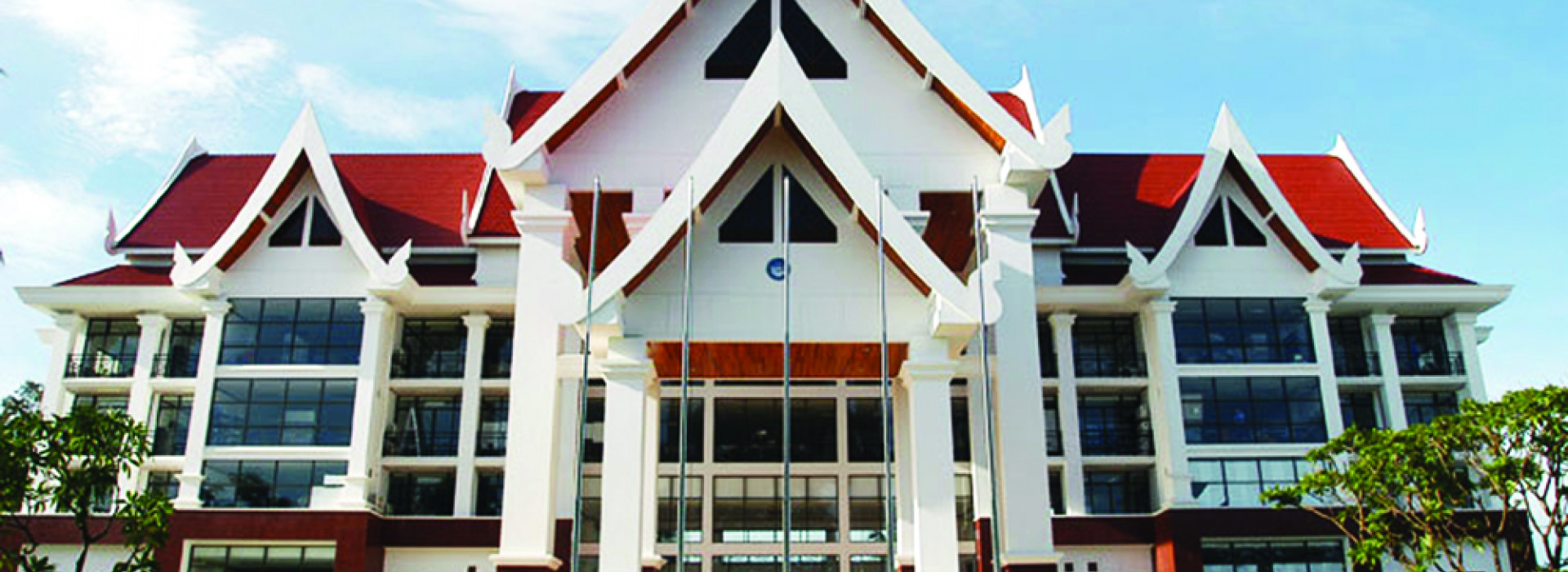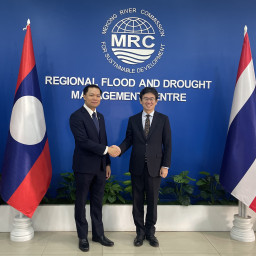Options for Mekong water use debated at Vientiane forum
Plans for the future use of Mekong Basin water resources as a tool for promoting economic growth are under scrutiny as water experts, NGOs and private sector developers meet with Mekong government representatives for two days in Vientiane, Lao PDR.
The Mekong River Commission (MRC), which is organizing the meeting, says that representatives from Cambodia, Lao PDR, Thailand and Viet Nam, the four Member Countries of the MRC, will outline what they see as the most significant trans-boundary impacts of the various hydropower and other water resource development options on the table over the next 20-30 years.
A range of development scenarios and models developed by the MRC will be discussed. By the end of this year the analysis of these will be presented to representatives from the Lower Mekong governments and inform a long-term strategy for development in the Mekong.
“Mekong countries have several options before them in terms of economic development of the basin over coming years and they need to agree on these, as they all have trans-boundary impacts,” said Jeremy Bird, CEO of the MRC. “The MRC has distilled these options into a set of different scenarios ranging from the ‘do nothing’ approach, through to ‘full development’ option, which would be the scenario if all countries carried out all planned tributary and mainstream irrigation projects and dams. The predicted affect of climate change is also considered. We have then analysed and modelled the socio-economic and environmental impacts that all of these scenarios would have, which is what will be discussed today.”
Hydropower is currently a dominant issue in water resource planning in the in the Lower Mekong Basin, with up to 12 dams proposed for the mainstream and dozens more planned for tributaries. The MRC says that before such developments go ahead, Mekong countries need to understand and balance the opportunities and risks of such schemes.
“Water has the potential to act as a powerful tool for economic development. However, if governments are to balance hydropower, fisheries, irrigation, navigation and flood management in the Lower Mekong Basin they have to understand the needs of all those that might be affected by any plans for development and how these needs may be impacted,” said Mr. Bird.
Mr. Bird also called for more research to underpin this process before Mekong governments decide on an acceptable level of development of the water resources of the basin.
“While there is a wide range of scientific and technical knowledge to underpin the analysis, there remain uncertainties. The science in this basin is complex and some of the monitoring programmes are in their infancy. Detailed risk assessments need to be completed to determine to what extent that uncertainty would influence any possible outcome,” he said.
Environmental activists are present at the meeting and are likely to give a critical analysis of some of the government and private sector proposals for development of the Mekong.
But while hydropower may be a central issue, the MRC says that it is not the only factor relating to water resources issues in the Mekong Basin.
Other development challenges up for discussion will include the over-exploitation of fisheries; the trans-boundary water-use and allocation issues inherent to increased irrigation and agriculture; and localised pollution from navigation and industry. Superimposed on these are the consequences of climate change that need to be addressed, says the MRC.
“We need to make sure that other beneficial uses of water resources are fully recognised and supported in any forward looking strategy, including the abundant fishery and ecosystem resources of the Basin,” said Mr. Bird.
-ends-
Notes to Editors
The 3rd Regional Stakeholder Forum on the Basin Development Plan, takes place 29-30 July 2010 at Don Chan Palace Hotel, Vientiane, Lao PDR.
The MRC is committed to meaningful stakeholder participation to ensure that water resource management helps to reduce poverty. Involving stakeholders provides a communication channel for the needs and interests of member states and their people to be reflected in decisions that affect them.
The Forum outcomes will be used to inform the MRC’s Basin Development Strategy.
to find out more information about results and this event.
The Mekong is one of the most active regions in the world for hydropower with eight existing or planned Mekong mainstream dams in Yunnan Province in China and 12 proposed by Cambodia, Lao PDR and Thailand – all in various stages of investigation or feasibility study.
The proposed mainstream hydropower dams in the Lower Mekong can have both positive and negative consequences for people dependant in the basin. On the positive side, for example, electricity generated from hydropower dams can meet the countries’ demand while providing foreign exchange earnings to supply rural development projects. However, damming the river will cause changes in flow regimes, water quality and sedimentation leading to changes in wetland areas, increased risk of bank erosion and the reduced flows of nutrients. While more research is needed, perhaps the biggest impact could be the barrier effect that dams have to fish migration.
The MRC is working with Mekong governments to develop coordinated and integrated impact assessments, consistent and fair mitigation measures, and hydropower development strategies and policies and addressing these issues in a number of ways, including research and studies on fisheries, the aquatic environment and water quality. It also has a formal role as the facilitator of discussions amongst the four Member Countries on these proposals as part of the provisions of the 1995 Mekong Agreement.
The Prior Notification, Prior Consultation Procedures agreed to by Cambodia, Lao PDR, Thailand and Viet Nam require any Member Country planning hydropower schemes on the mainstream of the river to have these plans approved by all four countries in the Lower Basin.
The MRC is currently conducting a Strategic Environmental Assessment of the proposed dams planned in Cambodia and Lao PDR to assess the scale of likely risks and opportunities and the affectivity of possible mitigation measures. Later this year the MRC will publish the results of this work.
The MRC is the intergovernmental body responsible for cooperation on the sustainable management of the Mekong Basin whose members include Cambodia, Lao PDR, Thailand and Viet Nam. In dealing with this challenge, it looks across all sectors including sustaining fisheries, identifying opportunities for agriculture, maintaining the freedom of navigation, flood management and preserving important ecosystems. Superimposed on these are the future effects of more extreme floods, prolonged drought and sea level rise associated with climate change. In providing its advice, the MRC aims to facilitate a broad range of dialogue among governments, the private sector and civil society on these challenges.
For more information
Mr. Damian Kean, Interim Communication Advisor
Tel: +856 56120695 or +856 21 263 263 Ext. 4703
Email: damian@mrcmekong.org
Mr Khy Lim, Communication Officer
Tel: +856 20 5622 8131
Email: khy@mrcmekong.org





